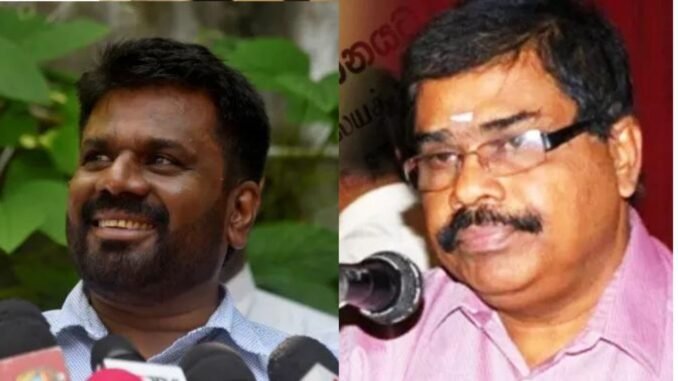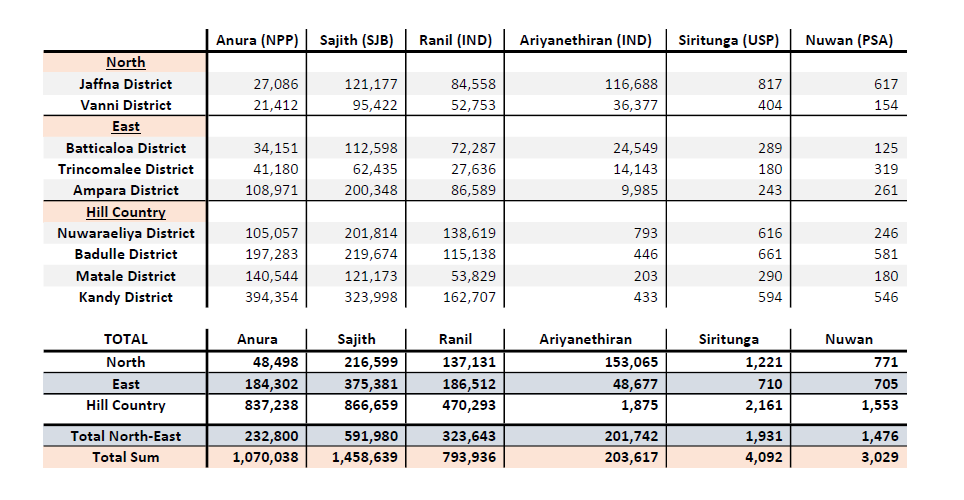
-Saarankan
The 9th presidential election that took place on the 21st of September 2024 is nothing like what has happened in the past. It is the first election since the mass movement (Aragalaya) that ousted the former president Gotabaya. This election also marked a deep political fragmentation that took place throughout the country. The real contest was between two parties whose votes were very close, leading to delays in counting. It is the first time in Sri Lanka’s history that second preferential counting had to take place, as no clear winner emerged at the first count.
The proportional representation voting system used in the presidential election allows voters to choose their first, second, and third preferences on their voting ballot. The first preferential vote was divided between Anura Kumara Dissanayake (AKD) of the National People’s Power party (NPP) who received 42% and Sajith Premadasa of the Samagi Jana Balawegaya (SJB) party receiving 32%. No single party could achieve the required minimum threshold of above 50% to secure the presidential election win, and thus second preferential counting had to take place, declaring Anura of the National People’s Power as the victor.
Various agencies have predicted violence if the JVP-led NPP loses the election. Hence, a curfew was announced until noon on the 22nd. The battle between Anura and Sajith has been fierce. Sajith had to fight for every vote, particularly doing everything to attract voters from the North and East. Sajith also faced problems, as a section of the capitalist class supported Ranil Wickremesinghe, leader of his former party, the UNP (United National Party). However, Ranil Wickremesinghe stood as an independent candidate with the illusion that this may bring him more votes.
On the other hand, AKD took a “hardline” approach and continued with their legacy of whipping up Sinhala chauvinism, building its core base in the south of the island. AKD’s policies did not represent Marxist policies. He was able to garner the support of former supporters of the Rajapaksa family, winning a significant majority even in places like Hambantota. Some media, particularly Western media, refer to him as a Marxist candidate, which is completely wrong; AKD also made sure that they distanced themselves from Marxist principles to win the election.
Anura is also often depicted as the new alternative that will bring about a clean change to the corrupt government of Sri Lanka. AKD is also seen as someone who can lift the working class from the poverty and hardships that they are suffering. However, his policies and manifesto do not offer real change. AKD’s policies do not fundamentally differ from Ranil Wickremesinghe; Anura’s victory will not come from its supposedly ‘leftist’ policies. Instead, hope against hope and anger against the corrupt political establishment played a key role. The Sinhala chauvinist outlook also aided in building support for them.
Sajith represents the capitalist class. But as a desperate measure, he made promises to some Muslim and Tamil parties. This, combined with AKD’s terrible stance on the national question, means that the NPP made little gain in the North. A small section of the vote from the North and East did go to Anura, which is surprisingly more than they usually get. However, given the resources they used in the North and East for their campaign, AKD miserably failed in the North. The NPP failed to impress the voting population in the North. The population there didn’t come through for them mainly due to their position on Tamil demands, including national demands.
Sajith, on the other hand, won a significant number of votes in Kilinochchi, which had a substantial turnout of 68%. Although a significant section of the North-East voted in favor of Ranil, this does not mean that they are endorsing the elites and the capitalist class. What continues to dominate is the national question. This can be seen through the votes gained by the Tamil common candidate, Pakkiyaselvam Ariyenthiran.
The notion of a Tamil common candidate emerged much later in the election campaign. However, the Tamil common candidate was able to win a significant number of votes in the North and East. Ariyenthiran came second in the Northern district, behind Sajith. In the East, however, there remained a significant weakness, as they fell to third place, behind Sajith and Ranil. This raises many questions. Though the ITAK MP, who opposed Sumanthiran’s decision to support Sajith, is based in Kilinochchi, Sajith managed to gain significant votes even in his base. The very fact that the Tamil common candidate could not defeat a southern candidate even in Jaffna shows how fragmented Tamil votes have become.
Another observation is that Ariyenthiran, a Batticaloa MP, could not lead the vote gain even in his own region. He came behind all three southern candidates.
This highlights a massive disconnect between the Tamil working class and Tamil politicians. Trying to win Tamil votes without fully addressing all their demands—democratic, economic, and national—makes it impossible to mobilise them fully. All those involved in the Tamil common candidacy, as well as those asking Tamils to reject the southern chauvinist forces, must come forward to build a far-sighted political program among Tamils.
Among the Marxists who stood in the election, Siritunga Jayasuriya of the United Socialist Party (USP) stood out as someone who fully supported the rights of Tamils. He was the only candidate who placed the national question at the forefront. However, the national question alone is not enough to rally the Tamil-speaking people of the North and East. They have suffered tremendously from a prolonged war and a genocide that still haunts them. To ask them to trust Tamil politicians and abandon the trend of voting for southern capitalists, as seen in previous elections, will not bear fruit.
What is imperative is to highlight a clear position on the national question along with all other demands, aiming to build strength among the working class in the North, East, and also in the South. This strategy was not put forward by any candidate except the Socialist Party.
The post-election battle to secure the rights of the masses has just begun. The task ahead of us is immense. Those who stand firmly on the side of the masses must aim for maximum unity on a principled basis to strengthen our fightback.

